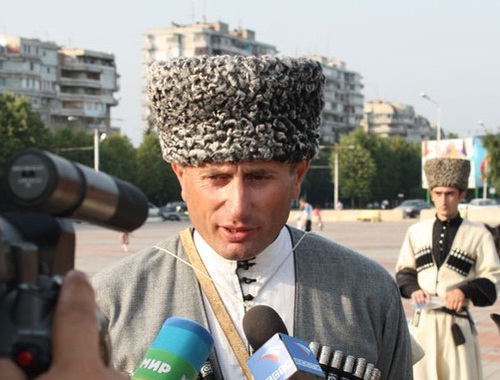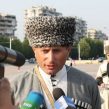
Russian TV Alleges Circassian Activist Is Conspiring Against Russian State
Publication: Eurasia Daily Monitor Volume: 10 Issue: 209
By:

On November 12, Russia’s NTV television channel broadcast a program called “Who Wants to Divide Russia?” which listed people who supposedly want to divide up the Russian Federation. The list included Yevgenia Albats, the liberal editor of the popular Russian magazine The New Times, whom the program accused of wanting to give away Siberia to China for saying on a radio program that she did not “see any great tragedy if Russia were to split along the Ural Mountains.” Alexander Budnikov, a Russian nationalist from Novosibirsk was presented as the founder of the Siberian Liberation Army and a proponent of the separation of Siberia from the Russian Federation. Budnikov later denied the accusations in his blog (https://vk.com/id10118456).
The NTV program paid special attention to the North Caucasus, reviving once again the allegation that foreign forces, specifically the United States and the United Kingdom, were meddling in the region to fuel separatism. Citing Gordon Hahn, a senior researcher with the Terrorism Research and Education Program at the Washington-based think-tank Center for Strategic and International Studies (CSIS), the video asserted that even US specialists agree that al-Qaeda is involved in the North Caucasus. Usually in contemporary phantasmagoric Russian TV propaganda pieces, al-Qaeda, the US and the West in general are said to be working side by side to ruin Russia (https://www.ntv.ru/peredacha/proisschestvie/m4001/o197856/comments/).
The program mentioned a number of other people as being among the subversive elements that also want to divide up Russia—mainly Russian opposition leaders like Alexei Navalny. Unexpectedly, the well-known Circassian activist Ibragim Yaganov was depicted in the NTV program as a proponent of an independent Circassian state in the North Caucasus that will include Stavropol and Krasnodar regions. The authors of the program further suggested that Circassian separatism was the same as the Caucasus Emirate and would create an Islamic Caliphate in the North Caucasus. Interestingly, the primary arguments against the separation of the North Caucasus from Russia did not include the interests of the people of the region, but rather the fear of a domino effect—that other Russian regions of might follow the North Caucasus’ lead (https://www.ntv.ru/peredacha/proisschestvie/m4001/o197856/comments/).
Russian President Vladimir Putin appears to share this limited, utilitarian view of the North Caucasus. In a speech at a Police Day celebration on November 10, Putin warned the assembled police officers: “You should constantly pay attention to the situation in the North Caucasus. Stability in this region is achieved at a high price, but there is no other way for us. The [territorial] integrity of Russia, peace in our land, the safety of our citizens, must be well-protected” (https://kremlin.ru/news/19593).
Identifying certain Circassian individuals, like Ibragim Yaganov, as Russia’s enemies is a relatively new development, but NTV’s “Who Wants to Divide Russia?” was aired as the 2014 Winter Olympics in Sochi approach, with the Russian authorities increasingly focusing on the issues of security in the North Caucasus and the situation in the Circassian republics. Circassian websites condemned the attack on Yaganov as a “provocation” (https://www.aheku.org/news/society/4989).
Moscow’s tactics appear to combine pressure on the Circassian activists with coopting some of them. For example, the Adygean parliamentary deputy Mugdin Chermit, who once was actively involved in the process of repatriating Circassian Syrians to the North Caucasus, was appointed deputy head of the Department for Internal Affairs in Krasnodar region. In his new capacity, Chermit will be responsible for conveying a positive image of the Sochi Olympics to Circassian communities worldwide (https://www.yuga.ru/news/313213/).
Meanwhile, a member of the International Circassian Association from the US, Nihad Younis, denied media reports that members of a delegation of Circassians from abroad who had been brought to Sochi had come out in support of the Sochi Olympics. According to Younis, their delegation was bussed in from the Shapsug villages in Krasnodar region to Sochi unexpectedly, and during the visit to the city no member of the delegation endorsed holding the Olympics in Sochi. Younis stated that he supported Circassian opposition to the Olympics, although he made it clear that only peaceful means of protests were acceptable (https://www.aheku.org/news/society/4990). Circassians oppose the Olympics in Sochi because they regard the Russian government’s ethnic cleansing of this territory as the first “genocide” of the 19th century. Moscow persistently downplays the importance of the issue and most of the time is silent about it, even though historical evidence of what happened is quite abundant, even from Russian historians and by Circassian researchers who accessed the Tsarist military archives in Tbilisi.
As the Olympics approach, the Russian authorities are ratcheting up the pressure on some Circassian activists, while giving official positions to others. This policy is not new and should have been expected from the very start of the dispute. Limited accommodation of the personal interests of select Circassian leaders may not work well this time, because many Circassians realize that the Sochi Olympics are a golden opportunity to raise their issues. Russia’s willingness to grant overly generous concessions to Circassian leaders is also fairly limited, in part because the authorities think they will easily be able to control the situation through intimidation and suppression, while Circassians in the North Caucasus are still too disorganized to stage peaceful mass protest actions. The promise of the Olympics, however, might change this situation and serve as a catalyst for improvements in the Circassians’ self-organization in the North Caucasus.




